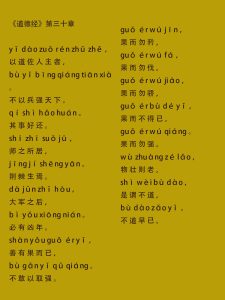Tao Te Ching Chapter 30

1. Classical Chinese Original
以道佐人主者,不以兵强天下。
其事好还。
师之所处,荆棘生焉。
大军之后,必有凶年。
善有果而已,不敢以取强。
果而勿矜,果而勿伐,果而勿骄,果而不得已,果而勿强。
物壮则老,是谓不道,不道早已。
2. Pinyin Transcription
Yǐ dào zuǒ rén zhǔ zhě, bù yǐ bīng qiáng tiānxià.
Qí shì hǎo huán.
Shī zhī suǒ chǔ, jīngjí shēng yān.
Dà jūn zhī hòu, bì yǒu xiōng nián.
Shàn yǒu guǒ ér yǐ, bù gǎn yǐ qǔ qiáng.
Guǒ ér wù jīn, guǒ ér wù fá, guǒ ér wù jiāo, guǒ ér bùdé yǐ, guǒ ér wù qiáng.
Wù zhuàng zé lǎo, shì wèi bù dào, bù dào zǎo yǐ.
3. Structured Translation & Interpretation
Section 1: The Danger of Military Force
- Original:
“One who assists the ruler with the Tao does not dominate the world with weapons.” - Meaning:
True leadership follows the Tao (自然之道, Natural Way), not violence. - Original:
“Such actions bring retaliation.”
“Where armies camp, thorns grow.”
“After great wars, years of famine follow.” - Meaning:
War creates cycles of suffering—destruction breeds more destruction.
Section 2: The Proper Use of Strength
- Original:
“Achieve results but do not boast, do not glorify, do not grow arrogant.”
“Do it out of necessity, not domination.” - Meaning:
Even in victory, humility is key. Force should be a last resort, not a tool for pride.
Section 3: The Law of Natural Decline
- Original:
“All things that reach their peak will decay—this is against the Tao.”
“What goes against the Tao dies early.” - Meaning:
Violence & arrogance lead to self-destruction (like a tree that grows too tall and breaks).
4. Key Concepts
| Chinese | Pinyin | Meaning |
|---|---|---|
| 兵 | bīng | Weapons, military force |
| 好还 | hǎo huán | “Retribution” (violence begets violence) |
| 凶年 | xiōng nián | Years of disaster (famine, suffering) |
| 果 | guǒ | “Fruit” (result, outcome) |
| 物壮则老 | wù zhuàng zé lǎo | “What flourishes must decay” (natural law) |
5. Philosophical Insights
- Anti-War Message:
Lao Tzu warns that military dominance is unsustainable—it disrupts harmony and invites backlash. - Wu Wei in Conflict:
Even when force is necessary (不得已 bùdé yǐ), it must be without pride or aggression. - Cyclical Nature of Violence:
Like Chapter 30 → Chapter 31 (which expands on the “ill omen” of weapons).
6. Modern Applications
- Leadership: Avoid coercive power—guide like water, not a hammer.
- Conflict Resolution: Force should never be the goal, only a reluctant means.
- Sustainability: Arrogance (e.g., over-exploitation) leads to collapse.
